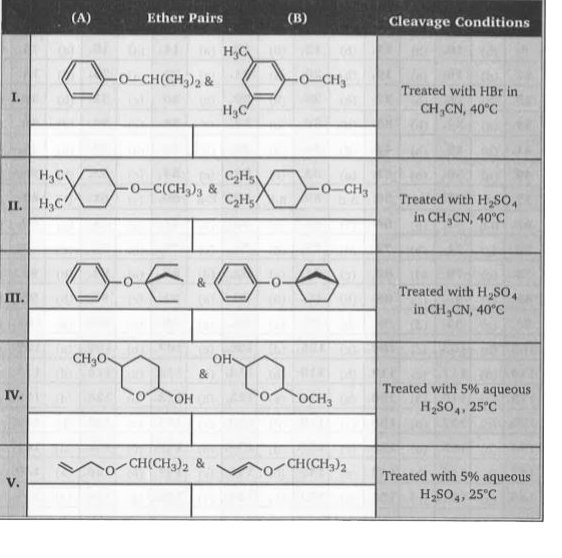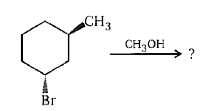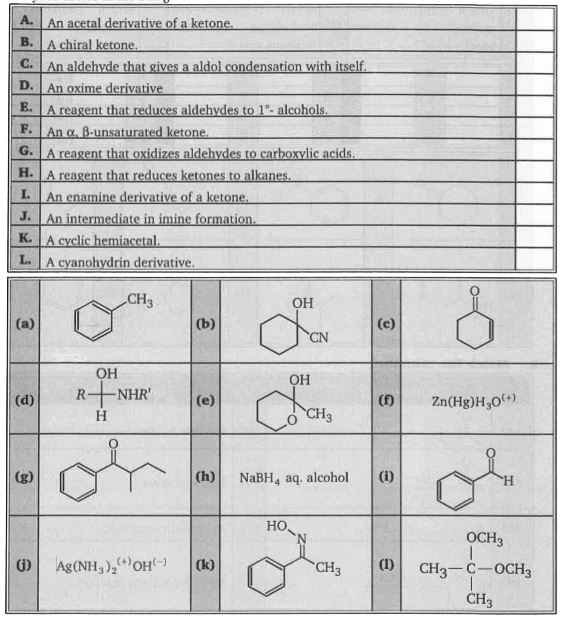Rank the transition states that occur during the following reaction steps in order of increasing stability (least → most stable) :
1. H3C−+OH2→CH+3+H2O
2. (CH3)3C−+CH2→(CH3)3C++H2O
3. (CH3)2CH−+OH2→(CH3)2CH++H2O Solution in Kannada
1<2<3
2<3<1
1<3<2
2<21<3
Rate can be explained bystability of carbocation
Topper's Solved these Questions
- ALCOHOL,ETHERS AND EPOXIDESBOOK - MS CHOUHANCHAPTER - ALCOHOL,ETHERS AND EPOXIDESEXERCISE - LEVEL-2
24 Videos
- ALCOHOL,ETHERS AND EPOXIDESBOOK - MS CHOUHANCHAPTER - ALCOHOL,ETHERS AND EPOXIDESEXERCISE - SUBJECTIVE PROBLEMS
1 Videos
- 5C ALKYL HALIDES BOOK - MS CHOUHANCHAPTER - 5C ALKYL HALIDES EXERCISE - LEVEL-2 (SUBJECTIVE PROBLEMS)
1 Videos
- ALDEHYDES AND KETONESBOOK - MS CHOUHANCHAPTER - ALDEHYDES AND KETONESEXERCISE - LEVEL-2
20 Videos
Similar Questions
Consider the pairs ofethers, numbered I throughV, shown below. To the right of each pairis a description of reaction conditions to be applied to each. One compound of the pair will react more rapidly than the other.
Which ether of the two will be more rapidly cleaved?
Write your answer in box.

View Solution
Maximum number of moles of Ac2O consumed by reactant (A) is :
View Solution
X = Total number of substitution and elimination product(s). Find the value of X.
View SolutionSelect the best choice for example (A to L) from the examples (a to n) given below. Write your choice in the box given.


View SolutionIn the following hydration
CH3−CH3∣CH−CH=CH2H3O+−−−→
the major product formed is
View SolutionRank the transition states that occur during the following reaction steps in order of increasing stability (least → stable)
1. H3C−+OH2→CH+3+H2O
2. (CH3)3C−+OH2→(CH3)3C++H2O
3. (CH3)2CH−+OH2→(CH3)2CH++H2O
View SolutionColumn (I)Column (II)(a)PhMgBr+CO2H⊕3O−−→P.Nuc≤oϕlicadditionreaction(b)CH3MgBr+Ph−O∣∣C−ClH⊕3O−−→Q.Nuc≤oϕlicadditionelim∈ationreaction(c)CH3MgBr+Ph−O∣∣C−OC2H5H⊕3O−−→R.Ph−OH∣C∣CH3−CH3(d)PhMgBr+CH3−O∣∣C−CH3H⊕3O−−→S.PhCOOH
View SolutionRank the transition states that occur during the following reaction steps in order of increasing stability (least rarr most stable): {:(1.,H_(3)C-overset(+)(O)H_(2)toCH_(3)^(+)+H_(2)O),(2.,(CH_(3))_(3)C-overset(+)(O)H_(2)to(CH_(3))_(3)C^(+)+H_(2)O),(3.,(CH_(3))_(2)CH-overset(+)(O)H_(2)to(CH_(3))_(2)CH^(+)+H_(2)O):}
View SolutionCH3−CH2CH3∣CHCH=CHCH3H3O+−−−→
Major product of the reaction
View SolutionWhich of the following reactions will yield propan-2-ol ? Select the right answer from (a), (b), (c) and (d) I. CH_(2)=CH-CH_(3)+H_(2)O overset(H^(+))(rarr) II. CH_(3)-CHO overset(CH_(3)MgI//H_(2)O)(rarr) III. CH_(2)O underset(H_(2)O)overset(C_(2)H_(5)MgI)(rarr) IV. CH_(2)=CH-CH_(3) overset("Neutral "KMnO_(4))(rarr)
View SolutionCH3CH=CH2+PdCl2+H2OCuCl2−−−→CH3O∣∣CCH3+Pd+2HCl
The above reaction is an example of
View SolutionWrite the product of following reactions :
(a) CH3−H3C∣C=CH3∣C−CH3O3−−−−−→Zn/H2O , (b) CH3−C≡C−CH3O3−−−−−→Zn/H2O
( c) CH3−C≡C−CH3O3/H2O2−−−−−→ , (d) CH3−CH3∣C=CH−CH3O3/H2O2−−−−−→
View SolutionThe reaction, (CH_(3))_(3)C-Br overset(H_(2)O)rarr (CH_(3))_(3)C-OH is
View SolutionCH_(3)-CH_(2)-O-underset(CH_(3))underset(|)(C)=CH_(2)overset(H_(3)O^(oplus))rarr Products are
View SolutionCH3MgBr+CH2=CH−O∣∣C−HH3O+−−−→ उत्पाद (1:4 योग) है। यह है
View SolutionWhat are X, Y, Z in the following reactions ?
OH |CH3−CH−CH3x−−→CH3−CH=CH2+H2O
CH3−CH2−OHY−−→CH2=CH2+H2O
CH3 |CH3−C−OHZ−−→CH3−C=CH2+H2O | | CH3 CH3
View Solution
